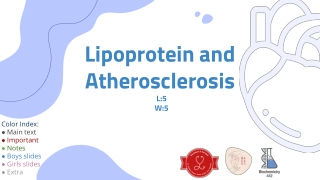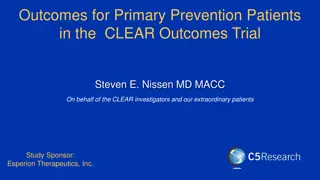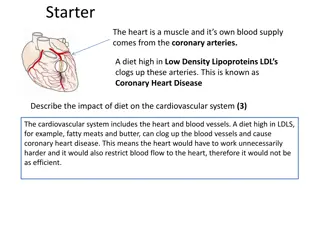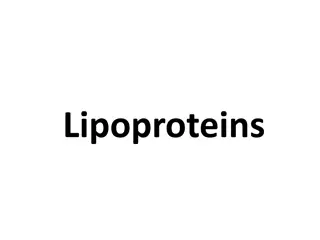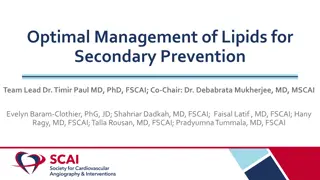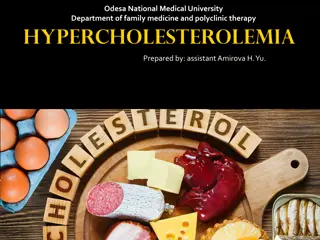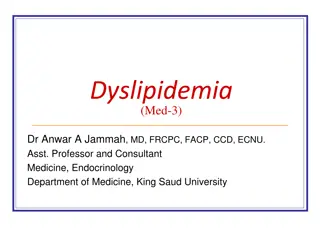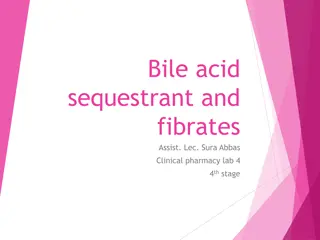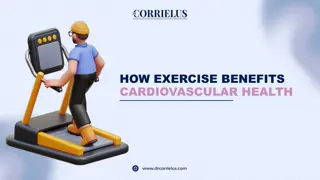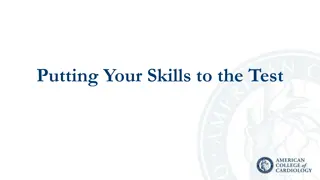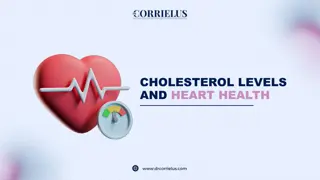Lipoprotein and Atherosclerosis
Understand the correlation between lipoprotein metabolism imbalance and the development of atherosclerosis. Learn about LDL and HDL cholesterol metabolism, receptor-mediated endocytosis, and the role of lipoprotein(a).
1 views • 19 slides
Inflammation and Cholesterol Predicting Cardiovascular Events
This study explores how inflammation and cholesterol levels predict cardiovascular events among 13,970 statin-intolerant patients in the CLEAR Outcomes trial. Findings suggest residual inflammatory risk may be a stronger predictor than residual cholesterol risk for future events. The research analyz
0 views • 17 slides
The REPRIEVE Trial: Developing Cardiovascular Disease Prevention Strategy for People Living with HIV
The REPRIEVE trial focuses on developing a cardiovascular disease prevention strategy for individuals living with HIV. It addresses the increased risk of CVD in this population, even with good viral suppression. The study evaluates the use of pitavastatin, a statin with anti-inflammatory properties,
1 views • 33 slides
CLEAR Outcomes Trial: Bempedoic Acid for Cardiovascular Prevention
The CLEAR Outcomes Trial investigated the effects of bempedoic acid, an ATP citrate lyase inhibitor, on cardiovascular outcomes in primary prevention patients. Results showed a reduction in cardiovascular events with bempedoic acid, particularly in patients intolerant to statins. Baseline characteri
1 views • 13 slides
Impact of Diet on Cardiovascular Health
The impact of diet on the cardiovascular system is significant, with a high intake of LDL leading to clogged arteries and increased risk of Coronary Heart Disease. Regular exercise brings about positive changes in the cardiovascular system, enhancing heart function and oxygen delivery. Immediate ben
0 views • 7 slides
Understanding Lipoproteins: Structures and Functions
Lipoproteins are compound lipids formed by the aggregation of neutral and amphipathic lipids with proteins (apoproteins). They serve as vehicles for transporting lipids through the bloodstream and lymphatic system, acquiring polarity due to their hydrophilic properties. These macromolecules are synt
0 views • 51 slides
Optimal Management of Lipids for Secondary Prevention Team Study
Lipid management in secondary prevention plays a crucial role in reducing cardiovascular risk. This study led by Dr. Timir Paul aims to address system-level gaps in care, enhance communication for optimal therapy, and empower patients in achieving target lipid levels. By recognizing disparities and
0 views • 28 slides
Understanding Cholesterol and Its Impact on Health
Cholesterol is essential for bodily functions but too much of it can lead to health issues. LDL cholesterol is known as "bad" cholesterol, while HDL cholesterol is considered "good". High cholesterol levels can increase the risk of heart disease and stroke. Managing cholesterol through diet, weight
0 views • 19 slides
Understanding Dyslipidemia and Lipid Transport in Atherosclerosis
Dyslipidemia is characterized by abnormal levels of lipids in the blood, leading to atherosclerosis. Lipid transport mechanisms play a crucial role in the formation and progression of atheromas in artery walls. Chylomicrons carry fats from the intestine to the liver, where they are processed into LD
0 views • 54 slides
Understanding Bile Acid Sequestrants and Fibrates in Clinical Pharmacy
Bile acid sequestrants such as colestipol and cholestyramine act by binding bile acids, promoting hepatic conversion of cholesterol, and increasing LDL-receptor activity to clear LDL-cholesterol. They may interfere with fat-soluble vitamin absorption and have common side effects like constipation an
0 views • 27 slides
How Exercise Benefits Cardiovascular Health
*Strengthens Heart Muscle: Regular exercise improves the heart's efficiency and increases its pumping capacity.\n*Improves Circulation: Enhances blood flow, promoting better oxygen delivery throughout the body.\n*Lowers Blood Pressure: Helps reduce hypertension by improving vascular function and pro
0 views • 3 slides
Understanding PCSK9 Inhibitors for Cardiovascular Health
PCSK9 inhibitors are a novel class of medications that help lower LDL cholesterol levels, reducing the risk of cardiovascular events. This article covers their mechanism of action, patient groups benefiting from them, efficacy in LDL-C lowering, and safety considerations. Learn how PCSK9 inhibitors
0 views • 8 slides
Cholesterol levels & heart health.pptx
LDL Cholesterol: High levels can lead to plaque buildup, increasing heart disease risk.\nHDL Cholesterol: \"\"Good\"\" cholesterol helps remove LDL from arteries, protecting heart health.\nTotal Cholesterol: Balance between LDL and HDL is crucial for
0 views • 4 slides
